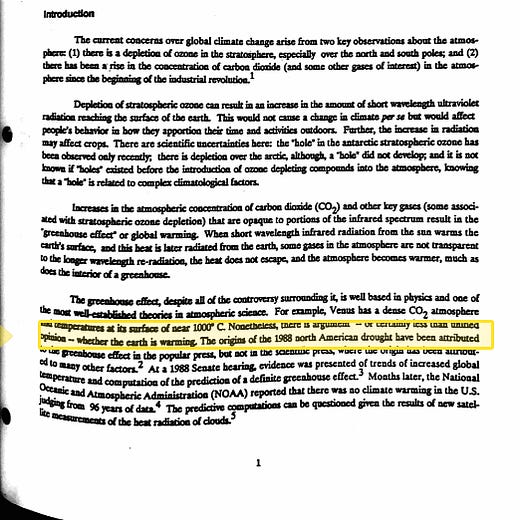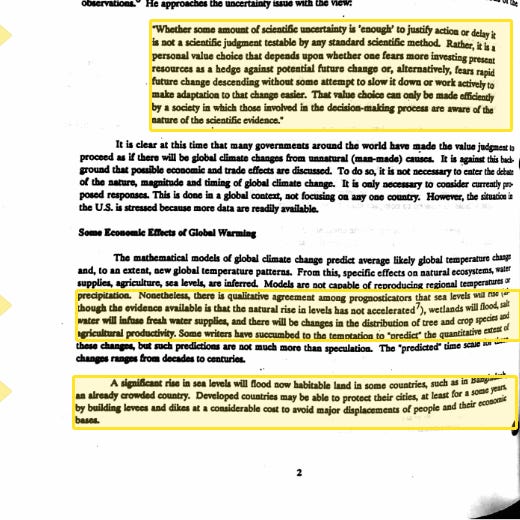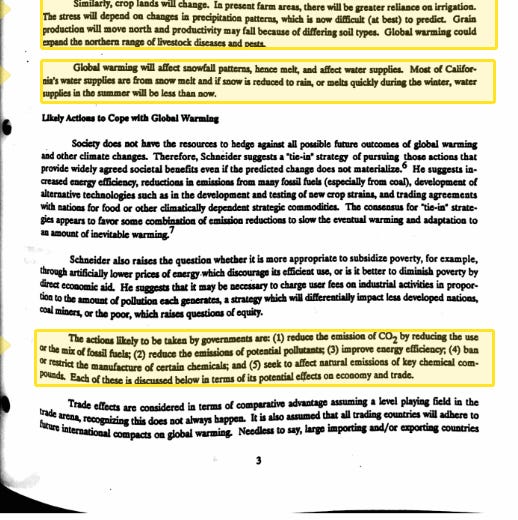The Chamber of Commerce knew and lied, too
We spoke with Cole Triedman, lead author of new research on the business association’s climate deception.
Emily Sanders is the Center for Climate Integrity’s editorial lead. Catch up with her on Twitter here.
Last week started with deadly heat waves and ended with a top Exxon lobbyist bragging about the company’s secretive methods of blocking climate policy on camera. But the big climate accountability news didn’t end there: news outlets reported on a leaked draft report written by top global scientists calling out the fossil fuel industry’s deception for catalyzing our current climate emergency.
The draft report from the Intergovernmental Panel on Climate Change says climate disinformation and lobbying campaigns created “risks to society” by preventing governments from acting to reduce greenhouse gas emissions. Big Oil companies didn’t do that dirty work on their own.
From POLITICO: “The draft IPCC report blamed think tanks, foundations, trade associations and other third-party groups that represent fossil fuel companies for promoting ‘contrarian’ science that misleads the public and disrupts efforts to implement climate policies needed to address the rising threats."
One of the most powerful of those trade associations is the U.S. Chamber of Commerce, whose actions to block climate policy and accountability on behalf of Big Oil have graced this newsletter before. Which brings us to yet another important development from last week: the release of new research from Brown University’s Climate and Development Lab exposing the Chamber’s own history of climate denial and deception.
I spoke with Cole Triedman, a recent Brown University graduate and lead author of the report, for the takeaways. Our interview, edited for length and clarity, is below.
EK: Can you give us the toplines on what your research into the Chamber looked for, and what it found?
CT: I set out to collect as many primary sources as I could from 1989 to 2009 and have them as sort of a starting point for understanding how the U.S. Chamber was messaging about climate change. During this period, the Chamber messaged very differently when there was a threat of climate action — whether that be regulatory, legislative, or diplomatic — than they did when there was a vacuum of climate action. When they weren’t threatened, the Chamber tended to put out this non-transformative, industry-driven vision of a very gradual approach to climate change, which put a lot of faith in the fact that American companies would innovate their way out of this problem eventually. When the Chamber was under threat, they pivoted to attacking whatever was in front of them.
They messaged on climate based on what was convenient for them at the time — whereas their opposition to climate governance action was steadfast.
EK: What were some of the most shocking examples of the Chamber’s climate deception over the years?
CT: I found this document from 1989 that was an internal speech given by Harvey Alter, a resources and policy official at the time, to the International Chamber of Commerce at an event, where he was basically predicting all of these really dire, adverse climate impacts in great detail. Shortly thereafter, the Chamber switched gears to not talking about climate change whatsoever — not using the term climate change or global warming, even when they were referring to it in policy briefs. Over the course of the late 90s and 2000s, the Kyoto Protocol was brought to the forefront of policy discussions, and the Chamber gradually ramped up their messaging of climate science skepticism, uncertainty, and eventually full-out climate denial.
I bookended this report with an analysis of this petition they filed to the EPA, around the time of the Endangerment Finding in 2009, where the Chamber was trying to put climate science on trial. After having this very robust prediction of how climate change would affect people and economies across the world in 1989, by the time 2009 came around, they were comparing institutional climate science to creationism.
EK: Why does the Chamber care so much about blocking climate action?
CT: The Chamber still has Big Oil companies sitting on their board and other carbon intensive companies that want to see the clean energy transition happen slowly and not transformatively, and those companies presumably still have a decent amount of power and call the shots. Big corporations are really keeping this organization financially afloat, and a lot of these energy companies are some of the wealthiest in that business association.
One of the reasons the Chamber is so hard to study is that so much of what goes on within those walls is completely opaque to researchers and the public. It is so hard to figure out who’s really funding the Chamber, and it’s also really hard to say with any certainty what goes on in those board meetings and whose voices are heard.
EK: The Chamber has used a variety of methods to discredit lawsuits against the fossil fuel industry holding them accountable for their deception on climate, including filing legal briefs on the industry’s behalf. What do you take away from the Chamber’s opposition to climate litigation?
CT: For people who are looking for an example of the Chamber’s real priorities on climate outside of the legislative and regulatory sphere, their involvement in this litigation provides a clear signal that they’re very much wedded to the oil industry, and would much prefer that the oil industry saves however much money is on the line than address this past of deception of fraud that seems fairly clearly laid out in these cases. That’s basically another refusal to own up to what they’ve been doing, and signals a discrepancy with their professed position that “inaction is not an option.”
You have a historically climate denying organization coming to the aid of historically climate denying companies in cases about climate denial… who can we really trust here?
ICYMI News Roundup





